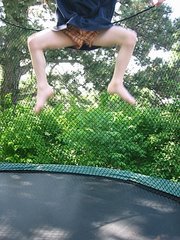Your Worst Fears Come True

In her fabulous and dead-on truthful book, Bird by Bird: Some Instructions on Writing and Life, Anne Lamott writes about her students' inherent fears about being writers: “[They] want to know why they feel so crazy when they sit down to work, why they have these wonderful ideas and then they sit down and write one sentence and see with horror that it is a bad one, and then every major form of mental illness from which they suffer surfaces, leaping out of the water like trout—the delusions, hypochondria, the grandiosity, the self-loathing, the inability to track one thought to completion, even the hand-washing fixation, the Howard Hughes germ phobias. And especially, the paranoia.”
Your don’t have to be a writer to know that for most of us there is an undercurrent of neurosis that runs fairly reliably just below the surface of our day-to-day work of feeling normal in the world. Call it fear, call it self-doubt, call it just basic background worrying; the fact is that the suspicion that something may be dreadfully wrong or may be about to be dreadfully wrong, is, on some level, always with us.
Lamott writes, “You can be defeated and disoriented by all these feelings…or you can see [it] as wonderful material.”
I think this is true even if you aren’t a writer. Maybe if we invite our worst fears, those huge paralyzing ones and the small niggly ones, out to play, maybe they will begin to reveal themselves for what they are...our self-created ghosties that have a place in our lives somewhere, sure, but definitely not in the driver's seat.
So I'm going to give that a try.
“I, who am that shadowy presence with whom you try to bargain when you are afraid that things are going to go terribly wrong in your life, am here to tell you, finally, that yes, it’s true. Those headaches you get, and the dizziness you sometimes have, and that tremor in your hands? No, it’s not just stress and anxiety like the doctor said. It’s the beginnings of a degenerative nerve disorder that will slowly destroy your life and force you into a situation that you must accept with dignity and stoicism despite the gnawing adversity your life has become. And yes, if you had been diagnosed sooner, you would have had a better chance at early treatment, but everyone ignored your deeply-felt conviction that something was dreadfully wrong, just as you always feared they would.
Yes, your husband is either going to leave you for someone who has all the qualities you lack, and he will be fulfilled and happy while you will be eaten up with bitterness, jealousy and resentment. Or, he will contract a horrible illness which will either require you to become his full-time caregiver, a role you will have to take on gracefully and without complaint lest you seem mean of spirit, or will cause him to drop dead, leaving you with the task of raising your grief-stricken children alone.
And your son’s habit of lining things up in neat rows, and refusing to leave any task unfinished once he’s started? No, it’s not just typical childhood quirkiness. It’s the beginnings of OCD, triggered no doubt by some anxiety that he feels about his home life, meaning your mothering behavior, which is never as good as it should be. The OCD will go along nicely with the latent bipolar disorder that is the real cause of your other son’s mood swings and obnoxious attitude. Yes it’s true that if you had raised him on macrobiotic food and limited his intake of sugar, his life would be problem-free, and he would be a calm, happy person with a future of glowing health before him, instead of the inevitable mental health crises that will thwart his chances at a fulfilling life. And yes, it is your fault.
Your credit card debt is never going to be paid off, you won’t have enough money to live on after you retire, and you’ll have to work at Wal-Mart when you’re 72. After a lifetime of work, people will forget about you after you retire, your children will avoid you, and you’ll spend the last years of your life incapacitated, senile, and hostage to a health-care system that makes you feel disempowered and feeble. And no, you’ll never be sure that you’ve done something meaningful with your life.
Of course, it’s a real possibility that whatever your worries may be, they will pale before the inevitable global crises of world war, terrorism, an avian flu epidemic, and/or the effects of global warming. One morning you may wake up to find that your city has been plunged into some stark morning-after type of reality where nothing is the same as it was, and the stockpiled cans of ravioli and paraffin in your basement will be pitiful protection.
And by the way, you won’t ever lose that last ten pounds, and you’re never going to feel good about your body. When you finally realize that you’re never actually going to look any better than you do now, you’ll hate yourself for spending all your good years worrying about the size of your ass, or that you had a terrible disease. You’re always going to wonder if you should have made different choices in your life, and no, things aren’t ever going to get easier. Thank you for your attention.”
I feel better already. Now you try it.
Truly, under the right circumstances, writing can be a therapeutic act that helps us order our thoughts and to see when our perspective has really gone off the rails. Writing helps us to see more of ourselves, and hopefully, to be kinder, more tolerant, and more self-aware people because of it. And that's what the world needs, isn't it? Yes, it is.


















No comments:
Post a Comment